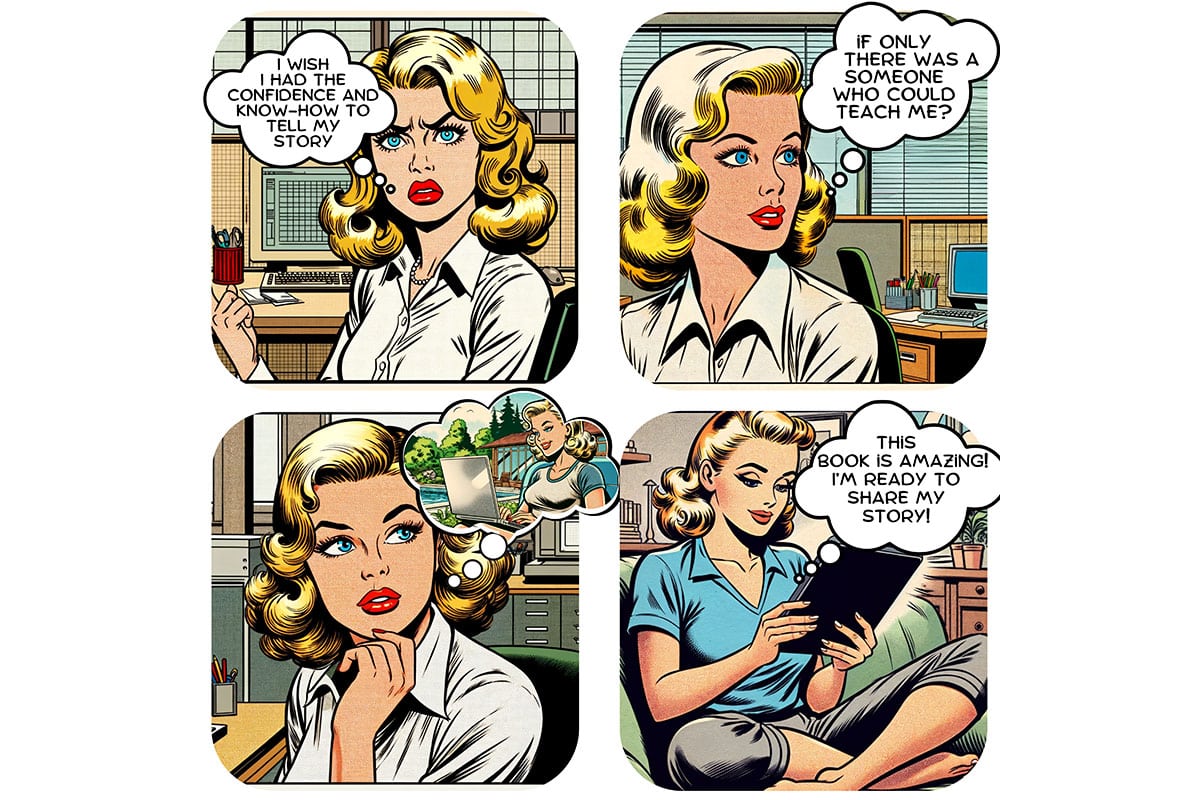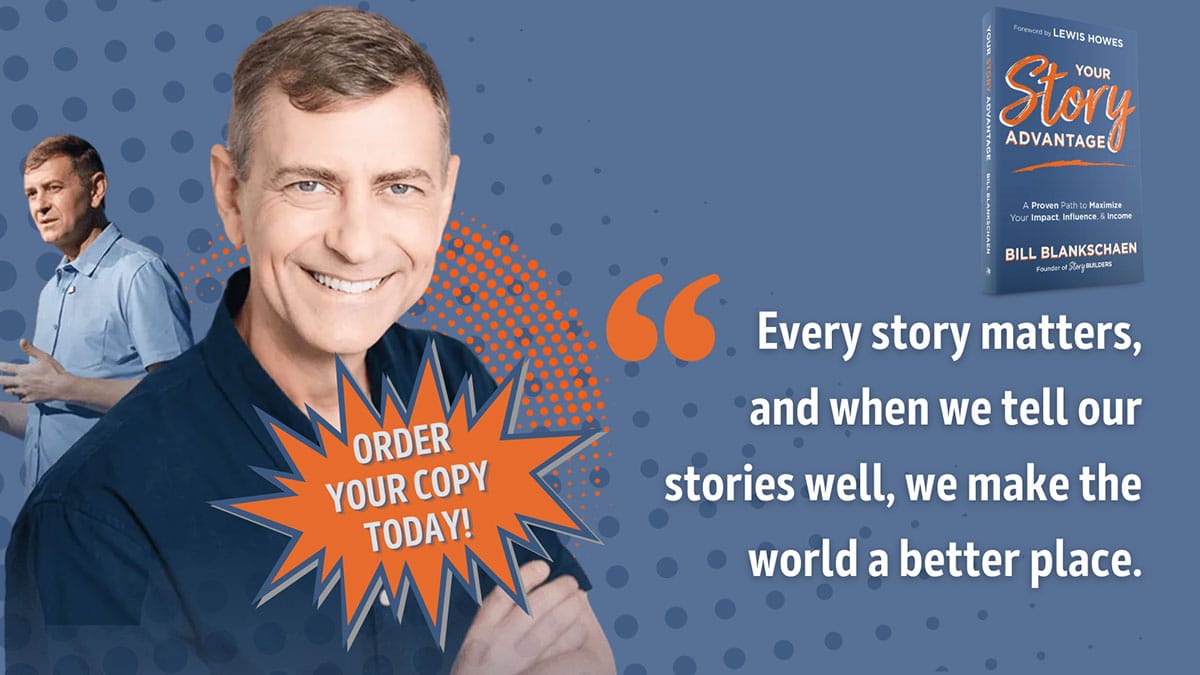As an entrepreneur, I've devoured countless books that promise to help me grow my business, sharpen my marketing, or level up my mindset. Some offered clever hacks. Some gave me frameworks. A few even shifted how I think. But every so often, a book arrives that doesn't just teach me something new — it reframes everything I thought I knew.
Bill Blankschaen's Your Story Advantage is one of those books.
At first glance, you might think it's another book about storytelling. But as an entrepreneur, I recognized quickly that it's actually about survival. Because in today's crowded, noisy marketplace, your story isn't just a nice-to-have. It's the only differentiator that can't be copied, hacked, or reverse-engineered.
Why This Book Hit Me Hard
Let me be transparent: for years, I underestimated the power of story. I thought success was about the product, the system, the funnel, the data. And while those things matter, they don't move people. People move people. And what moves people most are stories.
When I started out, I struggled with imposter syndrome. Who would want to hear my story? I wasn't a billionaire. I didn't invent the next iPhone. I hadn't conquered impossible odds. My story felt…ordinary.
Bill shatters that myth. He names it the Normalcy Trap — the lie that your story isn't special enough to matter. Reading this, I felt seen. He argues — and proves — that it's not the flashiness of your story that makes it powerful. It's the authenticity, the clarity, and the courage to tell it.
That realization alone was worth the book. But it was only the beginning.
The Story That Sold Me
Bill shares a moment early in the book that stopped me cold. He tells the story of a client — a business coach who had all the credentials, all the strategies, all the polish. But her business was stalling. When Bill dug deeper, he discovered she was hiding the most compelling part of her story: she'd filed for bankruptcy twice before finding success.
She thought that failure disqualified her. Bill helped her see it was precisely what qualified her. Within months of reshaping her messaging around that journey — the falls, the lessons, the comeback — her business exploded. Not because she added a new service. Because she finally told the truth.
That story wrecked me. Because I realized I'd been doing the same thing. Polishing the victories. Hiding the messy middle. Thinking that made me more credible, when really it just made me forgettable.
After reading that chapter, I rewrote my entire About page. I put the struggle front and center. Within two weeks, I had three new clients who said they chose me because of what I'd been through, not in spite of it.
The Framework Entrepreneurs Need
Bill lays out the Story EcoSystem™, and as an entrepreneur, I immediately saw its value. Business is already about systems — operations, sales, customer service. But few of us have a system for our most valuable asset: our story.
At the core of the EcoSystem is your BrandStory. This isn't just your origin story or your mission statement. It's the connective thread that explains why you do what you do and why anyone should care. When your BrandStory is unclear, your marketing feels scattered, your team feels misaligned, and your customers feel confused. And as Bill reminds us: confused people don't buy.
Surrounding that BrandStory are tools that multiply your reach:
- The StoryTelling Structure™ (Attention, Tension, Connection, Solution, Action) — a five-step formula that works whether you're writing an email, filming a video, or pitching on stage.
- The power of writing a book to establish credibility.
- The monetization of your intellectual property to sustain growth.
- The partnerships that accelerate your reach.
I've read books that give one piece of this puzzle, but Bill connects it all in a way that actually feels doable. The StoryTelling Structure alone has changed how I write sales pages. I now start every piece of content by asking: what grabs attention, what creates tension, and where's the emotional connection?
Books as Multipliers
One of the most entrepreneurial parts of the book is his emphasis on writing your own book. Now, I've written and published before, and I know how intimidating it can be. But Bill makes a compelling case: in a world of short-form noise, a book is still the strongest authority builder you can create.
It's not just about the content. It's about what a book signals: permanence, clarity, commitment. A book forces you to refine your ideas, and it positions you as "the one who wrote the book on it." As entrepreneurs, credibility is currency. A book gives you that in spades.
Bill also removes the overwhelm by showing how a book can be structured around your story and your framework. You don't need to write an encyclopedia. You need to write a clear, story-driven guide that multiplies your message.
His metaphor stuck with me: "A business card gets thrown away. A book gets kept." That's the difference between noise and legacy.
Money Without Shame
Here's where I found myself nodding hardest: the chapter on monetization.
Entrepreneurs walk a fine line. On one hand, we want to serve. On the other, we need to eat, scale, and thrive. Many of us carry guilt about charging for what we do — especially when it involves personal stories. It can feel like selling out.
Bill reframes this perfectly: money is not exploitation, it's energy. It's not the goal, it's the fuel. Monetization doesn't cheapen your story; it sustains it. Without it, your impact dies out. With it, your impact multiplies.
This mindset shift alone can free so many entrepreneurs from the guilt that keeps them playing small.
The Ethical Compass
But Bill doesn't stop at mechanics. He digs into the ethics. He asks the hard question: when does storytelling inspire, and when does it exploit?
As entrepreneurs, we've all seen marketing that crosses the line — exaggeration, manipulation, trauma porn. It may work short-term, but it erodes trust long-term. Bill reminds us that ethical storytelling requires intention, agency, and empathy.
He offers a simple test: Would you still tell this story if there was no money attached? If the answer is no, you're exploiting, not inspiring.
That resonated deeply with me. Because trust is the ultimate currency in business. Without it, you have nothing.
The AI Question
One of the most forward-looking parts of the book is his reflection on AI. As an entrepreneur, I've been experimenting with AI-generated content, and yes, it's efficient. But Bill raises the crucial question: what happens when machines can tell stories as well as — or better than — we can?
His answer: they never will. Because while AI can mimic, it cannot feel. It cannot choose. It cannot carry the scars and triumphs of a human life.
And that means our responsibility as entrepreneurs is greater than ever. In a world flooded with synthetic stories, authentic human stories become priceless.
He writes: "In the age of AI, your humanity is your competitive advantage." That line is already taped to my monitor.
Where the Book Falls Short
I want to be honest: this book isn't for everyone. If you're looking for a quick-fix marketing tactic or a viral growth hack, this isn't it. Bill's approach requires introspection, vulnerability, and patience. You can't outsource this work to a VA or automate it with software.
Also, while Bill provides excellent frameworks, the book occasionally feels like it's written more for coaches and consultants than for product-based businesses. If you're running an e-commerce store or a SaaS startup, you'll need to do some translation work to apply his principles to your context. It's doable — I did it — but it's not plug-and-play.
Finally, I wish there were more case studies. Bill shares several client stories, but I wanted to see before-and-after messaging examples, actual sales page rewrites, or revenue impact data. The concepts are powerful; more proof would make them irresistible.
My Biggest Takeaways as an Entrepreneur
Why I Believe Every Entrepreneur Should Read This
Entrepreneurship is about risk, vision, and resilience. But it's also about connection. If you can't connect, you can't sell. If you can't inspire, you can't lead. And if you can't clarify, you can't scale.
Your Story Advantage gives you the roadmap to do all three — connect, inspire, and clarify — through the most timeless medium we have: story.
This book will push you past imposter syndrome, silence your doubts, and show you not only that your story matters, but how to tell it in a way that multiplies everything you're building.
What I Did After Reading
Here's the proof: I rewrote my About page to include the bankruptcy I faced in year two. I restructured my email sequence using the StoryTelling Structure™. I started outlining a book I'd been avoiding for three years.
And in the month after making those changes, I saw a 40% increase in discovery call bookings. Not because my offer changed. Because my story finally matched my truth.
Final Thoughts
If I had to summarize this book in one sentence: your story is your moat. It's the one thing competitors can't clone, the one asset no downturn can erase, the one tool that can't be automated away.
Bill Blankschaen has written a guide that is equal parts strategy and soul. As an entrepreneur, I believe Your Story Advantage is not optional reading. It's essential.
Don't just read it. Apply it. Live it. And watch as your story becomes the very thing that changes your business — and maybe even the world.





Leave a Reply